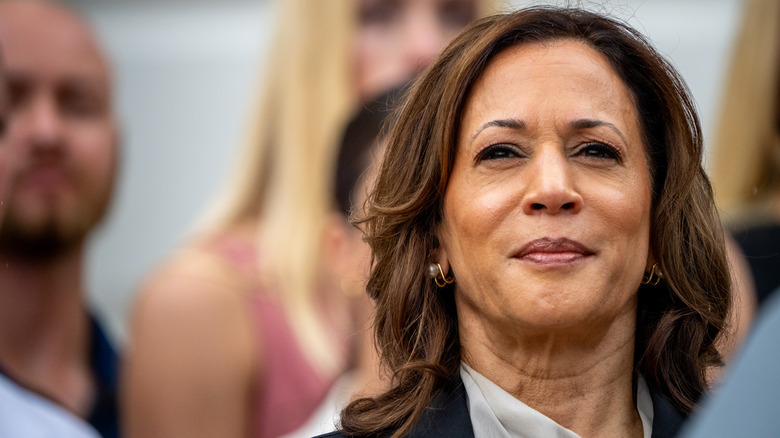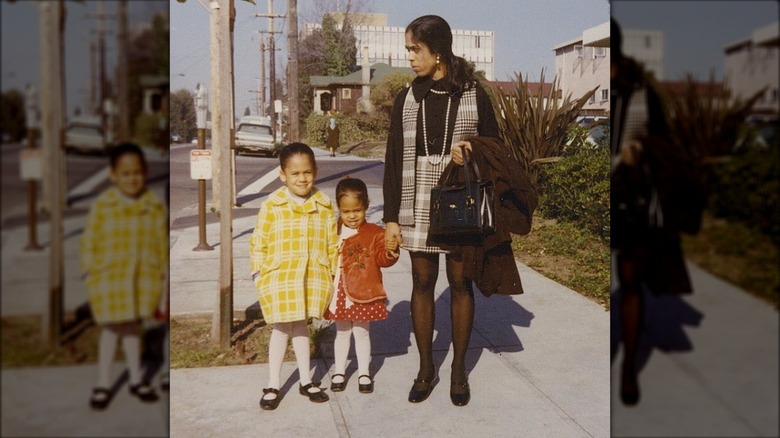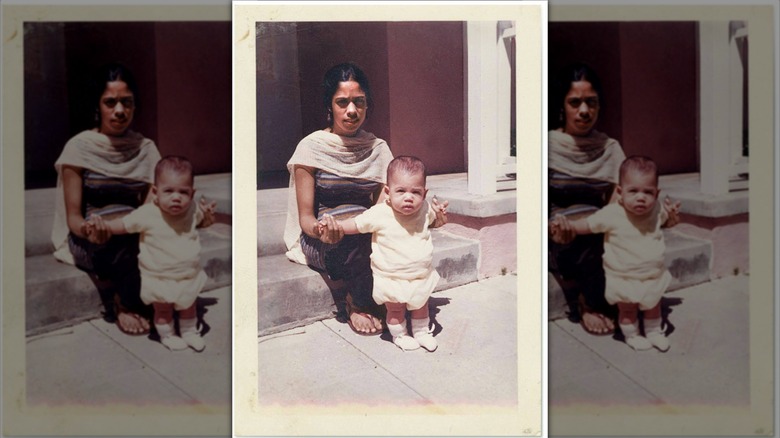What We Know About Kamala Harris' Parents
Kamala Harris' extensive career in and outside of politics serves as a precursor to Joe Biden's endorsement of the vice president as the 2024 Democratic presidential nominee. Even before she was elected attorney general and later a state senator, Harris had an impressive career working as a California prosecutor. With all of her history-making accomplishments in mind, Harris' background plays a noteworthy role in her legacy, with the politician continually naming her world-renown mother as an inspiration.
"Because of who my mother was and what she believed, what she had the ability to dream was possible and worked to make possible," the vice president said. "The fact that my mother never asked anyone permission to tell her what was possible is why, within one generation, I stand here as a serious candidate for the United States" (via NBC). Kamala was born to Shyamala Gopalan and Donald Harris in 1964, with her parents meeting after they had immigrated to the U.S. from India and Jamaica, respectively.
Gopalan, who died of cancer in 2009, was known for her breast cancer research, while Donald is an accomplished economist and professor. While the two divorced in 1972, with Gopalan receiving primary custody of their two children, their shared commitment to social activism had a profound impact on their oldest daughter.
Donald and Shyamala met as college students
Both of Kamala Harris' parents, Shyamala Gopalan and Donald Harris, immigrated to the U.S. to attend the University of California, Berkeley as graduate students. Gopalan was only nineteen years old when she left her family in southern India, with the young scientist expected to return to her home country and commit to an arranged marriage after completing her studies.
"But fate had other plans," Kamala wrote in her memoir "The Truths We Hold: An American Journey" in 2019. "She and my father met and fell in love at Berkeley while participating in the civil rights movement. Her marriage — and her decision to stay in the United States — were the ultimate acts of self-determination and love." Gopalan and Donald met at their college's Afro-American Association, an intellectual group centering around Black history and culture, and married in 1963.
"They fell in love in that most American way," Kamala stated during her 2020 Democratic National Convention speech. "While marching together for justice in the civil rights movement of the 1960s." After having two children together, Gopalan and Donald's careers pulled them in different directions. Donald accepted a position at the University of Wisconsin as Gopalan settled in California with their daughters. Though they still loved each other, the friction in the marriage was clear to a young Kamala, with the vice president remarking in her memoir that "they had become like oil and water."
Kamala's mother serves as a major inspiration
Throughout her prolific career, Kamala Harris' relationship with her late mother has remained a pivotal part of her worldview, with the politician revealing the motherly advice that serves as a daily inspiration. According to her obituary, Shyamala Gopalan was an ingenious scientist, earning her PhD from UC Berkeley in nutrition and endocrinology and conducting research at universities across North America and Europe. Her biggest contribution to the field of breast cancer research was her work centering around progesterone and breast tissue's hormone-responsiveness, which laid the way for countless scientific advances.
Still, as an immigrant, Gopalan faced many obstacles. "My mother, who raised me and my sister, was a proud woman. She was a brown woman. She was a woman with a heavy accent," Harris told NBC. "She was a woman who, many times, people would overlook her or not take her seriously. Or, because of her accent, assume things about her intelligence. Now, every time, my mother proved them wrong."
In these ways, Harris' mother has served as a chief inspiration to the presidential nominee, one that she hasn't been afraid to name. "My mother instilled in my sister, Maya, and me the values that would chart the course of our lives," she said during her 2020 Democratic National Convention speech. "She raised us to be proud, strong Black women. And she raised us to know and be proud of our Indian heritage."


